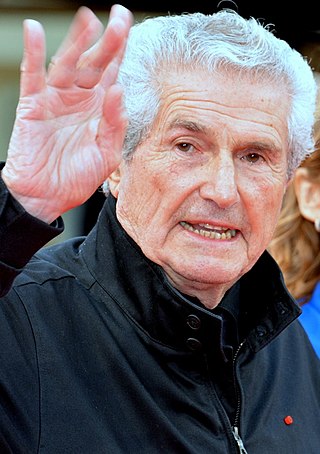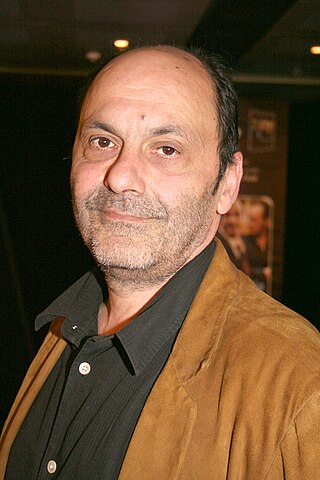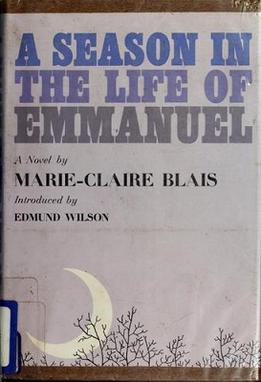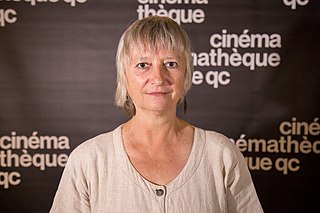Related Research Articles

Claude Barruck Joseph Lelouch is a French film director, writer, cinematographer, actor and producer. Lelouch grew up in an Algerian Jewish family. He emerged as a prominent director in the 1960s. Lelouch gained critical acclaim for his 1966 romantic melodrama film A Man and A Woman. At the 39th Academy Awards in 1967, A Man and a Woman won Best Original Screenplay and Best Foreign Language Film. Lelouch was also nominated for Best Director. While his films have gained him international recognition since the 1960s, Lelouch's methods and style of film are known for attracting criticism.

Jean Raoul Robert Rochefort was a French actor. He received many accolades during his career, including an Honorary César in 1999.

Marie-Josée Saint-Pierre, born in Murdochville in 1978, is a Quebec director and producer of animated films. She is an associate professor at Université Laval, a theorist, and an author on women's animation cinema.
Henri Storck was a Belgian writer, filmmaker and documentarist.

Jean-Pierre Bacri was a French actor and screenwriter.

Cinema of Morocco refers to the film industry of Morocco. Aside from Arabic-language films, Moroccan cinema also produces Tamazight-language films. The first film in Morocco was shot by Louis Lumière in 1897. The first three Moroccan feature films were funded between 1968-1969. Most researchers and critics agree that the history of Moroccan cinema started with Hamid Bénani's Wechma (1970), which is recognised as the first cult movie in Moroccan film history, and received critical acclaim on an international scale. Until then films produced in the country were Moroccanised versions of Egyptian melodramas. Other influential Moroccan films include A Thousand and One Hands, which was the first feature length fiction film of the 1970s.

Histoire(s) du cinéma is an eight-part video project begun by Jean-Luc Godard in the late 1980s and completed in 1998. The longest, at 266 minutes, and one of the most complex of Godard's films, Histoire(s) du cinéma is an examination of the history of the concept of cinema and how it relates to the 20th century; in this sense, it can also be considered a critique of the 20th century and how it perceives itself. The project is widely considered Godard's magnum opus.
Gilles Carle, was a French Canadian director, screenwriter and painter.

The 26th Cannes Film Festival was held from 10 to 25 May 1973. The Grand Prix du Festival International du Film went to Scarecrow by Jerry Schatzberg and The Hireling by Alan Bridges. At this festival two new non-competitive sections were added: 'Étude et documents' and 'Perspectives du Cinéma Français'.

Raymond Depardon is a French photographer, photojournalist and documentary filmmaker.
Gérard Patris was a French film director and television director who died in a car accident in 1990 in Chailles. His works include the documentary film Arthur Rubinstein – The Love of Life.

A Season in the Life of Emmanuel is a French Canadian novel by Marie-Claire Blais, published in 1965.
Laurence de Cambronne is a French journalist, novelist and humanitarian.

Patrick Bokanowski is a French filmmaker who makes experimental and animated films.

François Bott was a French author who after a long career as a journalist and literary critic became a writer of novels, one of which, Une minute d’absence (2001), won the Académie Française's Prix de la Nouvelle. He continued as a literary critic, writing essays focused on other writers, especially Roger Vailland.
François Porcile is a French film director, essayist, film historian and musicologist.

Sophie Bissonnette is a Canadian director, editor, writer, and producer in the Quebec film industry. After graduating from Queen's University, she began creating films in Montreal. She released most of her documentary films in the 1980s. In these films, Bissonnette illustrated social and political justices, both of which were topics that were covered commonly by many Quebecois filmmakers. However, her films were distinguishable through exploring the women's perspective of male-dominated social engagements and incidents in French Canada.
Alain Jomy is a French film music composer, music critic, film critic, director, and writer. He trained at the École Normale de Musique de Paris where he was taught by Hélène Boschi.

Jacques Robert Penel Skorsky, known as Nicolas Skorsky was a French composer, lyricist, and music producer.
References
- ↑ "matchID - Moteur de recherche des décès". deces.matchid.io. Retrieved 2024-11-09.